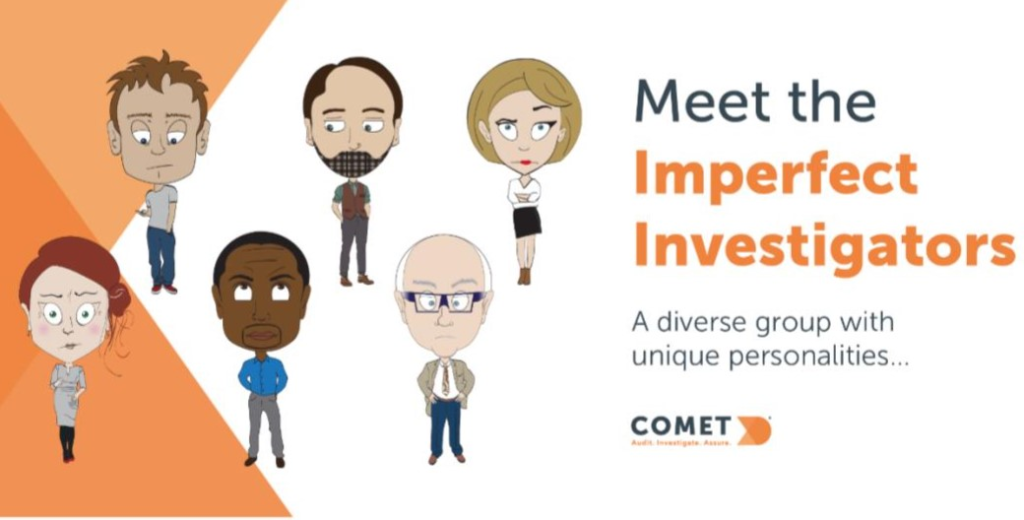
Member blog
Author
A resilient and engaged workplace is the cornerstone of safety and efficiency in the rail industry. However, addressing the challenges associated with incident investigations within the industry can often be a nebulous phenomenon.
Improving investigative processes requires a strategic approach to recognise and rectify gaps and areas of opportunity within our teams. The team behind COMET – a technology-enabled root cause analysis tool, has developed an effective concept for improving investigative processes and named it ‘Imperfect Investigators’. The theory is based around promoting growth and knowledge within teams.
The thinking behind this transformation comes from the Human & Organisational Performance (HOP) philosophy, which shifts the focus from blame to learning, thereby nurturing a culture of continuous improvement and collaboration.
In the world of incident investigations, Imperfect Investigators can often hinder progress, but they also present opportunities for growth and learning. To improve the quality of our investigative processes, it’s essential to recognise and address the gaps and areas of opportunity that exist within our teams. HOP can aid in this transformation, helping remove the blame culture while refocusing on learning from both successes and errors within an organisation.
Let’s explore the personalities and profiles of the ‘Imperfect Investigators’ and how the principles of HOP can guide their transformation.
Prioritising Proactivity with Cursory Colin
Cursory Colin tends to rush through investigations, potentially overlooking critical details. HOP advocates that learning from all events is vital, this encourages him to prioritise investigations proactively by emphasising the importance of allocating sufficient time for thorough analysis. Colin should acknowledge that investing time upfront can prevent future incidents.
Cultivating Objectivity with Wrong-reason Wray:
Wray’s biased and opinionated nature can negatively impact investigations. Embracing objectivity and curiosity through a questioning attitude and validation of assumptions, as recommended by HOP, helps him challenge preconceived notions. Seeking diverse opinions and perspectives becomes integral, shifting the focus from validating existing beliefs to uncovering the truth.
Collaborative efforts with Lone Linda:
Lone Linda’s independence may result in missed opportunities for valuable input from colleagues. HOP advocates recognising the benefits of collaboration in generating well-rounded insights. Encouraging Linda to involve team members in the investigation process enhances the quality of investigations through shared expertise and opinions.
Balancing Attention to Detail with Micro Martin:
Despite good intentions, Micro Martin’s attention to detail can be detrimental, leading to overly intricate reports that miss the bigger picture. HOP suggests defining clear objectives for investigations to maintain focus and balancing attention to detail with the need for concise reporting.
Embracing Standardised Procedures with Maverick Mike:
Maverick Mike’s non-conformist nature may lead to deviations from established investigation processes. HOP promotes embracing standardised procedures for consistency and reliability, maintaining elements of the investigation system that is proven to be effective. Creativity should enhance existing processes, not replace them. Seeking clarification when unsure about established methods ensures that innovation complements, rather than disrupts, the investigative framework.
Committing to Self-Improvement with Infrequent Ingrid:
Infrequent Ingrid’s forgetfulness and resistance to change can result in knowledge gaps and inefficiencies. HOP encourages a commitment to regular training and self-improvement to stay current in the field. Setting reminders for updates and changes in tools and procedures becomes essential. Embracing change as an opportunity for growth is fundamental to Ingrid’s transformation.
To conclude, by incorporating HOP Principles within incident investigation, teams not only help individuals overcome their imperfections, but also transforms the overall culture. By eliminating blame and promoting collaboration and continuous improvement, organisations can adapt more effectively to changing circumstances, reduce incident recurrence, and enhance the overall safety and performance of their operations.
In the end, the Imperfect Investigators can evolve into ‘I’m Perfect’ investigators, continually striving to improve their incident investigation behaviours and, in turn, benefiting the organisation as a whole.
Tools like COMET Resilience empower organisations to gain insight into everyday work and enable powerful learning opportunities before harm occurs. Here’s where to find out more: https://www.cometanalysis.com/comet-resilience


